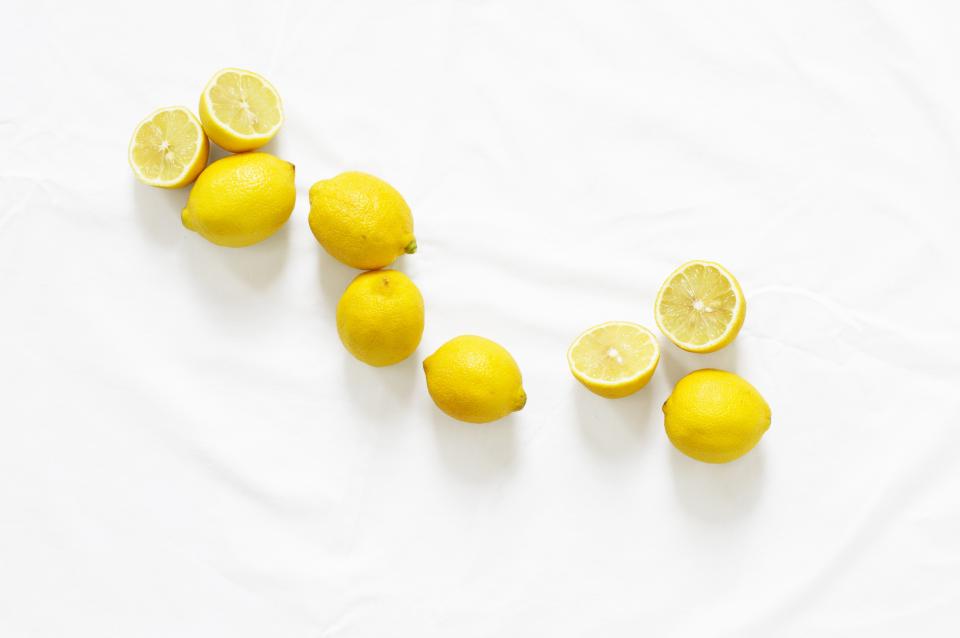A Personal Experience… the first digestive symptom and first indication of leaky gut I experienced was hypochlorydria (low stomach acid), which is rare for someone 16 years of age. Little did I know then, that it is linked to so many digestive symptoms and health conditions. I thought I was becoming intolerant to nearly everything I was eating. I started a food and symptom diary in an attempt to get to the bottom of it. The only conclusion I could draw between the random problematic foods, was that they all contained protein. I researched protein digestion and self-diagnosed myself with hypochlorydria. I am sharing with you what I have learnt along my journey of naturally restoring my stomach acid production. This blog introduces stomach acid, causes, symptoms and natural treatment.
What is stomach acid?
Stomach acid is composed of hydrochloric acid, potassium chloride and sodium chloride. The normal volume of stomach acid is 20-100ml and the pH is 1.5-3.5. This is at the acidic end on the pH scale of 0-14.
The gastrointestinal tract is considered external to the body in biology. It has direct contact with the outside environment. Stomach acid is a crucial part of the immune system. It protects the body against pathogens and foreign invaders. Low levels allow for overgrowth of unfavourable bacteria and yeast in the small and large intestine.
Functions of stomach acid:
Assists in the prevention of food allergies by allowing proper protein digestion. If undigested proteins reach the bloodstream, the body launches an immune response to attack the foreign invader. This immune response may result in food allergies. Multiple food allergies are common in leaky gut when many undigested proteins reach the bloodstream. Sufficient stomach acid helps to optimise digestion and reduce the occurrence of food allergies.
Stomach acid is required for the absorption of important nutrients, including iron, calcium, magnesium, zinc, copper and B vitamins.
Intrinsic factor is produced by parietal cells of the stomach and is necessary for vitamin B12 absorption.
Causes of hypochlorydria:
Stress ~ our parasympathetic nervous system is in charge of digest, rest and repair. When we are stressed our sympathetic nervous system is dominant, which is involved in our fight, flight and freeze responses. During times of mental, physical or emotional stress our body directs blood to our muscles in preparation to fight, flight or freeze. Our ancient biochemistry still believes every stressor is physical, famine or coldness, like the ones our ancestors encountered. When blood is directed to our muscles away from our digestive organs, it compromises our ability to digest our food. Check out my Stress Less Tonic and Enhance Your Resilience to Stress Blog.

Antacids ~ protein-pump inhibitor medications e.g. Losec are prescribed for acid reflux or heartburn. These greatly reduce stomach acid and often make digestive symptoms worse. Some other medications like NSAIDS (Non-Steroidal Anti-Inflammatory Drugs) have a similar effect. Determine the cause rather than take a medication to mask the symptoms.
Age ~ stomach acid production reduces with age. The occurrence of hypochlorydria increases with age, linear to nutrient deficiencies. Stomach acid allows for optimal digestion and absorption of nutrients.
Water with meals ~ drinking water with meals dilutes stomach acid, which has a pH of 1.5-3.5 and water is neutral at 7. Drink water between meals instead of with meals. Refrain from drinking water 20 minutes before meals and about an hour after meals.
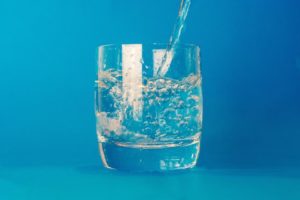
Zinc deficiency ~ zinc is required for stomach acid production, along with the production of over 200 enzymes in the body.
Salt deficiency ~ salt is a component of stomach acid, particularly chloride found as hydrochloric acid. In Traditional Chinese Medicine, salt is known to strengthen digestion.
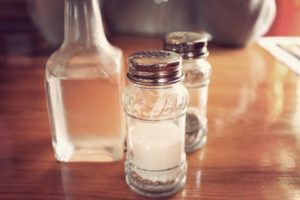
Irregular eating patterns ~ when we eat irregularly, our body produces stomach acid habitually even if we skip meals. Vice versa, when we eat outside of meal times our body does not have a ready supply of stomach acid as it is not expecting food.
Symptoms of hypochlorydria include bloating, ‘inflamed stomach’ feeling, digestive problems, leaky gut, multiple food allergies, conditions relating to yeast or bacterial overgrowth e.g. candidiasis and SIBO (Small Intestinal Bowel Overgrowth), and any symptoms relating to nutrient deficiencies.
The baking soda and apple cider vinegar experiment ~ many people mistaken indigestion, dyspepsia or acid reflux for too much stomach acid, when it is the opposite in most cases. To determine if it is over or under acidity in your case, mix one teaspoon of baking soda into a small glass of water and drink it 10-15 minutes before a meal containing protein. Note your symptoms. The following day add one tablespoon of apple cider vinegar to a small glass of water and drink it 10-15 minutes before a meal containing protein. Note your symptoms. If baking soda alleviated your symptoms, baking soda neutralises the acid, meaning that you have too much stomach acid. If apple cider vinegar alleviated your symptoms, it means you are under-producing stomach acid. In this situation, follow the natural treatment below.
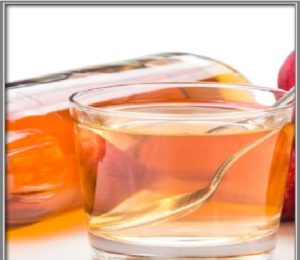
Natural treatment:
Lemon juice or apple cider vinegar are sour/acidic, which stimulate digestion and stomach acid production. Drink the juice of one small lemon/half a large lemon or one tablespoon of apple cider vinegar (in small amount of water is optional), 10-15 minutes before meals, especially those containing protein.

Bitter vegetables also stimulate digestion, and therefore, stomach acid production. Eat an abundance of green vegetables, including rocket, watercress, dandelion, kale and other leafy greens. Bitter herbs can be prescribed by a Herbalist to enhance digestion and absorption.
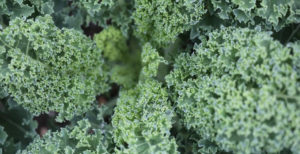
Zinc is found in oysters (highest source), beef, lamb and seafood. It is difficult to obtain sufficient quantities through diet alone, therefore, supplementation may be inevitable.

Salt is an important dietary inclusion. Include natural, unrefined salt in your diet. Celtic sea salt and Himalayan pink rock salt contain essential trace minerals along with sodium chloride. Celtic sea salt may contain more trace minerals due to its moisture, as water is a carrier of minerals.
Stress plays a large role in our ability to digest and absorb nutrients. Our parasympathetic nervous system is in charge of digest, rest and repair. Our sympathetic nervous system is in charge of fight, flight and freeze. Most of us predominantly live our lives in a state where our sympathetic nervous system is dominant. Diaphragmatic breathing is one of the most effective ways of activating the parasympathetic nervous system. Take 10 slow and deep breaths before each meal to enhance digestion and stomach acid production.

Circadian rhythm is the physiological process of living beings. It is endogenously generated, although can be modulated by the external environment such as sunlight and temperature. The body thrives on regularity and patterns. Having consistent eating habits enables the body to produce stomach acid consistently each day when it is expecting food. Aim to eat meals and snacks at a similar time every day.
Sensory experience is losing its importance in modern life. Traditionally, food was slow-cooked and produced aromas for a long time before serving. Smelling and sensing food communicates to our body that food is coming. That is why our mouths salivate when we smell and sense food, this is our digestive processes. Due to modern life, stress and fast food, this is now neglected. Take time to sense food and relax before eating to increase stomach acid production.
As alluded to in this blog, low stomach acid production is multifactorial – multiple factors are at play. The natural treatment path you ought to take, depends on the cause in your individual case. Consult with me to determine your cause and natural treatment approach.


